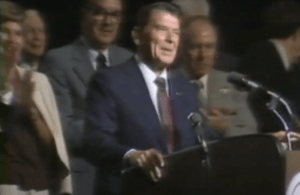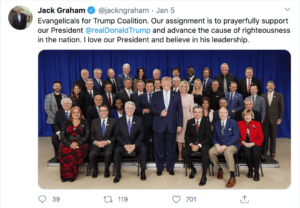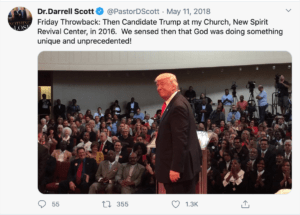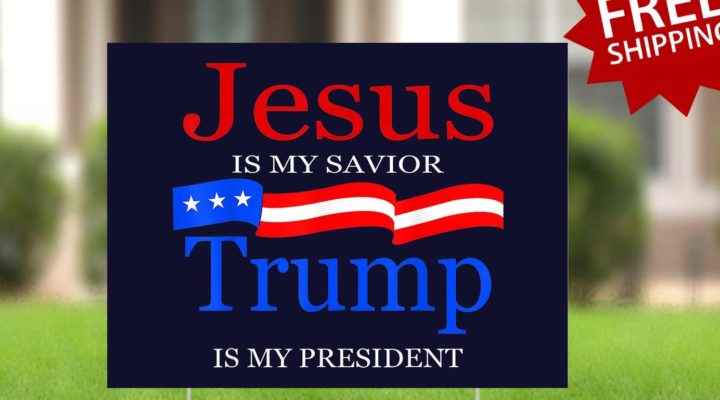“I’m done with Michael W. Smith.” That sentiment has been expressed widely this week on social media by Christians who have loved the veteran Christian singer-songwriter’s music but now find themselves disaffected by his apparent politics.
For public figures — and especially religious leaders — to explicitly or implicitly endorse a presidential candidate often carries more risks than rewards.

Michael W. Smith at the Washington worship rally.
Smith’s appearance and comments at a “worship rally” on the National Mall in Washington, D.C., Sept. 26 likely encouraged his fans who are Donald Trump voters, but his appearance also alienated his fans who are no fans of the president. The rally featured Vice President Mike Pence and standard-issue Religious Right rhetoric about abortion and conservatism and God and country.
Not that the Religious Right has a corner on the endorsement market in this most unusual of election years. More than 350 religious leaders in August signed a letter endorsing Democratic candidate Joe Biden, claiming Trump is unfit for office. For many of these faith leaders, this is a first-ever public endorsement of a candidate — once verboten in mainline and non-fundamentalist congregations.
What happened in 1980
Since 1980, evangelical Christianity has had a closer public tie to Republican Party politics than any other religious group with a political party in modern history. The two groups tied the knot with matchmaking work by Jerry Falwell Sr. and his Moral Majority organization.

Ronald Reagan speaking in Dallas, 1980.
But the iconic moment came in 1980, when a group called the Religious Roundtable held a huge meeting of evangelical Christians in Dallas. In those days, few pastors dared to publicly endorse any political candidate. That prompted then-presidential candidate Ronald Reagan to tell the pastors gathered in Dallas for the National Affairs Briefing: “I know you can’t endorse me, but I endorse you.”
Those words, and that meeting in Dallas, set in motion a chain of events that continues to play out today.
At this year’s Republican National Convention in August, Jack Graham, pastor of Prestonwood Baptist Church in suburban Dallas, echoed a common line among evangelical Christians who now believe there is only one way to vote: “Christians who are watching the major party conventions should ask themselves this simple question: Do the policies being discussed by these leaders align with our biblical values and beliefs? This question should tell Christians all they need to know.”
 The case for Trump
The case for Trump
One of the most ardent evangelical arguments for supporting Trump’s reelection came from the ultra-conservative theologian Wayne Grudem in World magazine’s current issue. Grudem is a Harvard-trained theologian, seminary professor and author. He co-founded the Council on Biblical Manhood and Womanhood, which advocates distinct God-given roles for men and women. He was interviewed by the magazine’s editor, Marvin Olasky, to make a positive case for Trump. Another interview subject made the opposite case.
“I recognize, and evangelicals in general who support Donald Trump recognize, that he has character flaws,” Grudem said. “But they do not seem to us to be disqualifying. Character matters, but policy also matters.”
Regarding Trump’s proclivity to lying, Grudem offered this explanation: “I looked at The Washington Post’s list of what it calls 16,000-some ‘lies’ Trump has spoken and examined 20 or 30 of them. They’re what I’d call conclusions drawn by a hostile interpreter of words that a sympathetic listener would understand in a positive way. President Trump is often not careful in some of the things he says. He is given to exaggeration. Sometimes he’s made a statement after being given inaccurate information. I’m not sure he’s ever intentionally affirmed something he knows to be false, which is how I define a lie. As you know, I have written an ethics textbook.”

Wayne Grudem
And regarding Trump’s character and divisiveness: “It’s bearing false witness against President Trump to say he seeks to divide us. He isn’t responsible for the rioting, the burning of cars, the blocking of public roads and sidewalks that began on day one of his presidency. No Americans legitimately have a fear of physical violence … for putting a Biden sticker on their car or wearing a Joe Biden campaign shirt or hat. But I know many evangelicals, including myself, who fear being physically attacked or shouted at if I were to put a Trump bumper sticker on my car or wear a MAGA or Trump-supporter hat in public.”
Black evangelical support for Trump
Grudem is an older white evangelical male, statistically a strong demographic for Trump. But there are some Black evangelical pastors in his corner too. Darrell Scott is pastor of New Spirit Revival Center in Cleveland Heights, Ohio, and co-founder of the National Diversity Coalition for President Trump.
In an August interview with WKYC-TV in Cleveland, the Black pastor was asked if Trump’s claim is true that he has “done more for the African-American community than any president since maybe Abraham Lincoln.”
 Scott’s reply: “Yes, I do agree with that, I’ve said it, and it generated a large degree of controversy when I said he’s been the most pro-Black president in my lifetime. … But I qualified that when I used the word ‘pro.’ When I used the word ‘pro,’ I meant pro in the sense of proactive. He’s been proactive toward the Black community rather than reactive. The major things that we’ve seen accomplished for the Black community have been reactionary measures to social upheaval. Whereas he comes along, he’s been doing proactive measures. Opportunity zones, proactive. Criminal justice reform, proactive. The prison reform, proactive. HBCU funding, proactive.”
Scott’s reply: “Yes, I do agree with that, I’ve said it, and it generated a large degree of controversy when I said he’s been the most pro-Black president in my lifetime. … But I qualified that when I used the word ‘pro.’ When I used the word ‘pro,’ I meant pro in the sense of proactive. He’s been proactive toward the Black community rather than reactive. The major things that we’ve seen accomplished for the Black community have been reactionary measures to social upheaval. Whereas he comes along, he’s been doing proactive measures. Opportunity zones, proactive. Criminal justice reform, proactive. The prison reform, proactive. HBCU funding, proactive.”
Polls consistently show that the vast majority of Black Americans disagree with Pastor Scott’s assessment. But there is a minority of Black voters — likely situated within the evangelical community — that approves of Trump’s performance.
A poll conducted by The Hill immediately after the Republican National Convention found Trump’s support among Black voters up 9 percentage points from before the convention. According to this Aug. 22-25 poll, 24% of registered Black voters approve of Trump’s performance as president, although 76% disapprove.
Writing for the polling website fivethirtyeight.com, Perry Bacon Jr. recently reported: “Polls suggest about 10% of Black voters both nationally and in key swing states with large Black electorates are supporting Trump. That is similar to 2016 …; surveys over the last three decades have shown about one of every 10 Black Americans identifies as a Republican.”
Further, “If the race is really tight, Trump’s maintaining this sliver of Black support could be critical,” Bacon explained.
Influence of the televangelists
Wikipedia is keeping a running tally of prominent figures who have endorsed either Biden or Trump. For Trump, that includes a special category for religious leaders. Among 22 currently listed, the majority are televangelists or podcasters. The list includes Franklin Graham, Kenneth Copeland, Paul Crouch, Jentezen Franklin, Robert Jeffress, John MacArthur, Guillermo Maldonado, Al Mohler, James Robison, Don Stewart and Paula White.
A May opinion piece by Patrick Geddis in The Independent, a UK newspaper, called attention to the fact that Trump’s “religious” supporters increasingly include marginal religious figures — politicians who claim a religious faith, for example — and purveyors of the prosperity gospel.
“Trump’s recent pivot towards a number of proponents of the prosperity gospel —including his promotion of Paula White as a special advisor within the administration — had left some traditional evangelists wondering what they got into,” Geddis wrote. “Given Trump’s reliance on the evangelical vote, it seems strange that he would pivot towards leaders who hold a controversial place within that movement. This makes more sense, though, in the context of the president’s reliance on image. Trump rose to prominence as a reality TV star and since his days on ‘The Apprentice’ has cultivated an image as a strong, savvy businessman.”
“While such leaders may not be the most accurate representation of evangelical values, they do look good on TV.”
He then added: “While such proponents of the prosperity gospel may not be the most effective preachers of ‘Christianity, the faith,’ they are talented at taking full advantage of ‘Christianity, the brand.’” And, “while such leaders may not be the most accurate representation of evangelical values, they do look good on TV.”
What’s said in private
Perhaps that’s a partial explanation for continued reports from former Trump staff members that while the president publicly fawns over religious leaders, privately he mocks them.
A Sept. 29 article in The Atlantic added fuel to this fire, which already had been set by revelations in Michael Cohen’s tell-all book. The Atlantic article quotes Cohen and others to say Trump has little understanding or appreciation for the faith leaders who support him.
“In private, many of Trump’s comments about religion are marked by cynicism and contempt, according to people who have worked for him,” wrote McKay Coppins. “Former aides told me they’ve heard Trump ridicule conservative religious leaders, dismiss various faith groups with cartoonish stereotypes, and deride certain rites and doctrines held sacred by many of the Americans who constitute his base.”
Cohen recalls Trump speaking about a group of religious leaders who came to pray over him. Afterward, he told aides: “Can you believe that bullshit?”
However, both Cohen and other White House aides told The Atlantic reporter that Trump does feel a special kinship to one religious group — the televangelists and faith healers.
“It helped that Trump seemed to feel a kinship with prosperity preachers — often evincing a game-recognizes-game appreciation for their hustle,” Coppins wrote in The Atlantic. “The former campaign adviser recalled showing his boss a YouTube video of the Israeli televangelist Benny Hinn performing ‘faith healings,’ while Trump laughed at the spectacle and muttered, ‘Man, that’s some racket.’”
Trump also took special interest in 2015 in the much-criticized prosperity evangelist Creflo Dollar, who was appealing to supporters for $60 million to purchase a private jet for himself.
“Trump seemed delighted by the ‘scam,’ Cohen recalled to me,” Coppins wrote. And then he quoted Cohen’s report of Trump’s summation of his prosperity gospel friends: “They’re all hustlers.”
Related articles:
Mormons and the 2020 presidential election: It’s complicated
This year’s tug of war over the Catholic vote and why it matters


